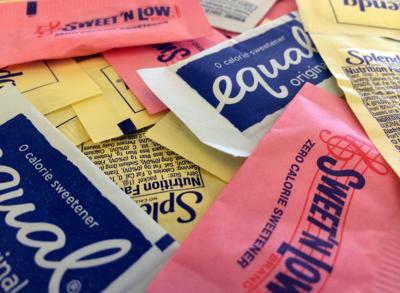Your sugar-free substitute, toothpaste, even your gum, might not be as healthy for you as you think.
A new study from researchers at the Cleveland Clinic — a non-profit medical institute based in Ohio — and found that the sugar substitute xylitol was linked to an increased risk of heart attack, stroke and other cardiovascular events.
The new study builds upon a growing body of research that has found dangers in consuming large amounts of sugar-alternatives. Nearly a year ago, the World Health Organization warned that artificial sweeteners like aspartame and stevia — often found in diet sodas — were linked to a greater risk of type-2 diabetes, cardiovascular disease and death in adults. Aspartame was also deemed a “possible” cause of cancer by the World Health Organization.
Sweeteners like stevia have been linked to type 2 diabetes, heart disease and death in adults, the WHO says — but some experts disagree.
Sweeteners like stevia have been linked to type 2 diabetes, heart disease and death in adults, the WHO says — but some experts disagree.
Dr. Stanley Hazen, director of the Cleveland Clinic’s centre for cardiovascular diagnostics and prevention, led the study into xylitol after his research team had found a link between another sugar alcohol, erythritol, and cardiovascular risk.
What is xylitol?
Xylitol is a natural sugar alcohol found in both plants and made by the human body. Sugar alcohols are similar to sugar — they are both carbohydrates and have similar structures, but sugar alcohols contain an alcohol molecule and aren’t processed by the body in the same way.
It’s often used in gum and toothpaste due to its dental benefits — there’s good existing research that xylitol “fights cavities,” Hazen said.
Xylitol is also used as a sugar-free or reduced sugar additive, as it not only has fewer calories, but doesn’t spike blood sugar or insulin to the same extent as added sugar, making it popular for diabetics and those on a Keto diet.
Is xylitol bad for you?
The study found that ten healthy volunteers who drank a typical portion size of a xylitol sweetened drink had a spike in their platelet responsiveness, suggesting the sweetener is “clinically associated with cardiac risk” through increased blood clotting, Hazen explained.
Hazen and other researchers also looked at the natural levels of xylitol in 3,000 participants after a period of fasting. Those in the highest quartile of natural xylitol levels had double the risk of heart attack, stroke and cardiovascular-related death versus those in the lowest quartile, Hazen said.
Hazen recommended that anyone with an increased risk of heart disease or blood clotting should avoid xylitol and erythritol, both sugar-alternatives.Â
Other risk factors, besides age and sex, Hazen explained, are high blood-pressure, high cholesterol, smoking, insulin resistance or diabetes and dyslipidemia.
In 2022, more than 57,000 Canadians died of heart disease, the second leading cause of death in the country.
The study, however, had its limitations. It looked specifically at xylitol consumption within a short time-frame.
“For outcomes like cardiovascular disease that take years to accumulate damage (or) changes that lead to heart attack and stroke, we need longer-term assessment of xylitol consumption,” Rachel Murphy, a professor at the University of British Columbia’s School of Public Health, who was not involved in the study, said.Â
Hazen also added that the study looked specifically at health volunteers, whose normal kidney functions meant that the effects of a xylitol-rich food or drink would only last about six hours, with platelets spiking within 30 minutes of consumption.
What should I eat instead?
“It is important to note that the study findings do not mean that people should avoid all xylitol,” Murphy said, and Hazen agreed.
Anything that isn’t swallowed, like your toothpaste or mouthwash that contains xylitol, is fine, Hazen said. And even a stick of gum with xylitol, which, according to Hazen, only contains about a gram of the sweetener, would have a minimal effect. In the study, participants consumed drinks with 30 grams of xylitol, which increased their plasma levels by nearly a thousand fold, Hazen said.
“Does a high school student need to worry about chewing a stick of sugar-free gum? I don’t think so,” Hazen said, but added, “I recommend, if you can avoid it, try to avoid it at this point.”
As an alternative, Hazen said good-old sugar or honey, “in moderation,” is a safer option.
“I know I’m being very provocative in saying that,” Hazen joked, “but all the data points to that. And I do think this is a significant public health care concern.”





























To join the conversation set a first and last name in your user profile.
Sign in or register for free to join the Conversation